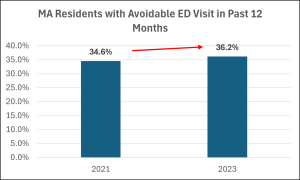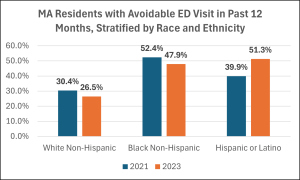Unnecessary ED Visits: Facts from the Massachusetts Primary Care Dashboard
(August 2025)
Unnecessary ED visits are widely seen as a costly symptom of a healthcare system with insufficient access to primary care. When people cannot easily get in to see a primary care clinician, they often end up in the ED for conditions that are better managed in the primary care setting. This is why one of the most telling sets of statistics reported in the Massachusetts Primary Care Dashboard, which the Center for Health Information and Analysis (CHIA) publishes in collaboration with MHQP, is the percent of residents with an avoidable ED Visit in the past 12 months.
In 2023, according to data collected in CHIA’s Massachusetts Health Insurance Survey, more than one-third of Massachusetts residents (36.2%) reported that they went to the ED for a reason that could have been treated by a general doctor, if one had been available. This was a notable increase vs. 2021 (34.6%).

Importantly, there are extreme racial/ethnic disparities in unnecessary ED use in Massachusetts. While 26.5% of White Non-Hispanic residents reported using the ED in avoidable circumstances in 2023, 47.9% of Black Non-Hispanic residents and 51.3% of Hispanic or Latino residents reported unnecessary use.

The increase in reported avoidable ED use among the Hispanic/Latino population drove the increase for the Massachusetts overall.
The preventive care that primary care doctors and nurses provide saves lives and dollars. A high-functioning primary care system has been shown to lead to better patient outcomes, lower costs, and more equitable care, and is key to keeping patients well and out of hospitals and emergency departments.
“When people are unable to see a primary care clinician, they get sicker and are forced to turn to hospitals or emergency departments, where it’s more expensive and more traumatic,” said MHQP President and CEO Barbra Rabson in a Letter to the Editor recently published in the Boston Globe.
With EDs across Massachusetts already experiencing substantial backups, it is more important than ever that we address primary care access so we can live up to the principle of delivering “the right care at the right time in the right place.”

